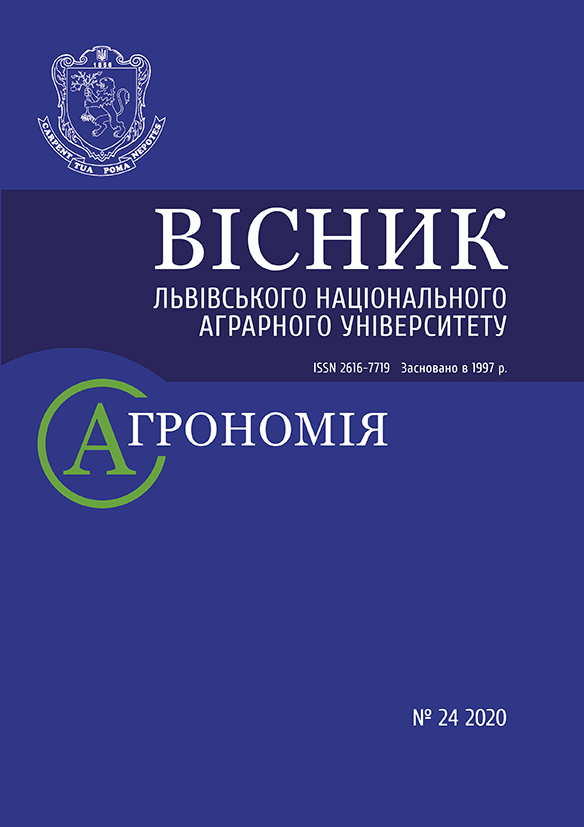Visnyk LNAU: Agronomy 2021 №25: 80-83
EFFECT OF SOIL HERBICIDES APPLICATION IN A FRUIT NURSERY ON THE GROWTH AND PRODUCTIVITY OF APPLE TREES
Hulko B., Candidate of Agricultural Sciences
ORCID ID: 0000-0002-5915-9564
Lviv National Agrarian University
https://doi.org/10.31734/agronomy2021.01.080
Annotation
Improvement of the quality of planting material and increase of the productivity in commercial nurseries are the important tasks today. An effective weed control system is one such element. There are no current recommendations for the use of soil herbicides in the fruit nursery in Lviv region. The most common and well-known soil herbicides were used in the experiment: Senkor (metribuzin), Racer (flurochloridone), Gesagard (prometrin), Butisan (metazachlor) and Dual Gold (methylchlorine). Herbicides were applied in the doses recommended by the manufacturer in the spring, before the beginning of leaf development, by continuous spraying of weed-free soil.
The analysis of the control of weed development in the apple orchard after application of herbicides showed that a more effective and long-term restriction of weed growth, among the studied drugs was provided by Senkor. Field birch, histle and veronica proved to be resistant to its action, which did grow in single arrays and did not compete with cultivated plants. The herbicidal action of Senkor decreased until the end of August – beginning of September, which made obvious by the emergence of seedlings of dicotyledonous weeds: quinoa, galinsoga, phlegm, field purslane and from the group of cereals: meadow bluegrass and thin-legged meadow. The results of rootstocks growth and one-year nursery trees depending on the applied soil herbicides show the high efficiency of this method of weed control. The best results were provided in case with soil treatment with Senkor herbicide (1 kg/ha; 600 l of water/ha).
As a result of experiments and calculations, it was found that the use of soil herbicides in the early stages (before the bud break) by continuous spraying of the fruit nursery did not have a depressant effect on rootstocks and apple trees. Among the studied soil herbicides, the best result was obtained in case of Senkor soil treatment - increased diameter and height of rootstocks in the first field of the nursery, one-year nursery trees in the second field of the nursery were more developed, increased yield of standard trees per unit area.
The analysis of the residual amount of Sencor (metribuzin) in the soil at the time of the tree harvesting (in November) showed a negative result.
Key words
apple, tree, nursery, soil herbicides, weeds
Link
- Aliev T. G. Application of sulfonylurea-based herbicides in fruit nurseries. Agro XXI. Publisher: Agrorus: 2007. № 1-3. Р. 25–26.
- Ivanenko O. O. Modern problems of herbology. Bulletin of Agricultural Science. 2004. № 3. Р. 27–29.
- Bondarchuk A. A. Weed infestation. Plant protection. 1999. № 9. Р. 2–4.
- Hulko B., Vuitsyk N. Influence of apple nurssery treatment with soil herbicides on apple trees quality. Horticulture, seed production, plants intoductuion: proc. of ХVIII Intern. scient. conf. Krasnoyarsk: SibGTU, 2015. P. 19–23.
- Hulko B., Vuitsyk N. A new approach to the apple tree production in nursery. Permaculture and ecologicaly safe agriculture: proc. of Intern. conf. Uzhhorod: Hoverla, 2018. P. 33–34.



